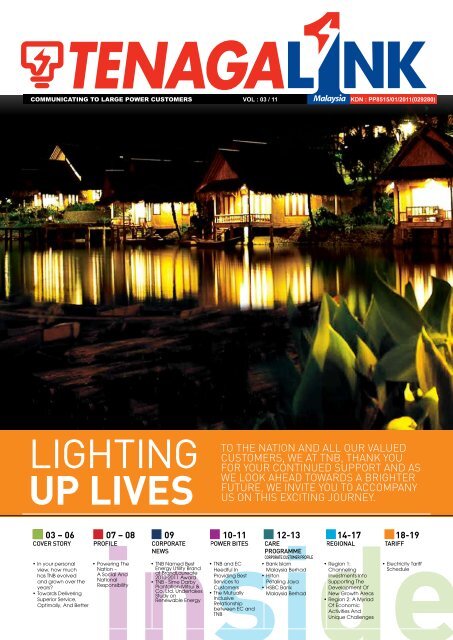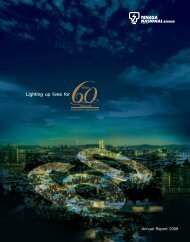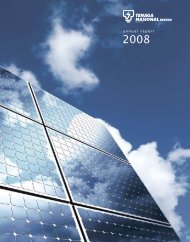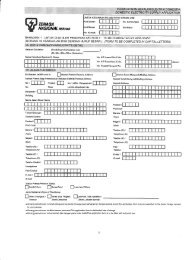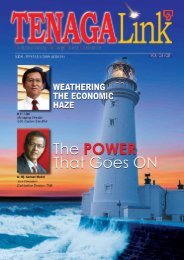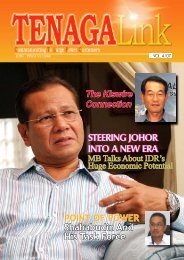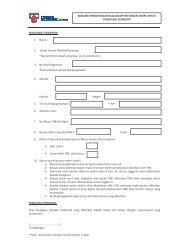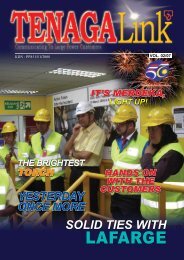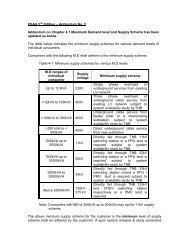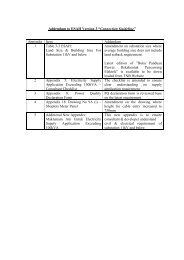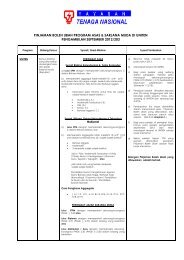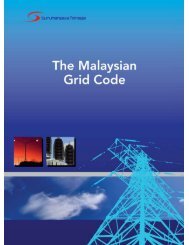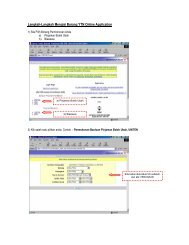LIGHTING UP LIVES - Tenaga Nasional Berhad
LIGHTING UP LIVES - Tenaga Nasional Berhad
LIGHTING UP LIVES - Tenaga Nasional Berhad
You also want an ePaper? Increase the reach of your titles
YUMPU automatically turns print PDFs into web optimized ePapers that Google loves.
COMMUNICATING TO LARGE POWER CUSTOMERS<br />
VOL : 03 / 11<br />
L NKDN<br />
K<br />
: PP8515/01/2011(029280)<br />
<strong>LIGHTING</strong><br />
<strong>UP</strong> <strong>LIVES</strong><br />
to the nation and all our valued<br />
customers, we at tnb, thank you<br />
for your continued support and as<br />
we look ahead towards a brighter<br />
future, we invite you to accompany<br />
us on this exciting journey.<br />
03 – 06<br />
COVER STORY<br />
• In your personal<br />
view, how much<br />
has TNB evolved<br />
and grown over the<br />
years<br />
• Towards Delivering<br />
Superior Service,<br />
Optimally, And Better<br />
07 – 08<br />
PROFILE<br />
• Powering The<br />
Nation –<br />
A Social And<br />
National<br />
Responsibility<br />
09<br />
CORPORATE<br />
NEWS<br />
• TNB Named Best<br />
Energy Utility Brand<br />
at BrandLaureate<br />
2010-2011 Award<br />
• TNB - Sime Darby<br />
Plantation-Mitsui &<br />
Co. Ltd. Undertakes<br />
Study on<br />
Renewable Energy<br />
10-11 12-13 14-17 18-19<br />
POWER BITES<br />
• TNB and EC<br />
Heedful In<br />
Providing Best<br />
Services to<br />
Customers<br />
• The Mutually<br />
Inclusive<br />
Relationship<br />
between EC and<br />
TNB<br />
CARE<br />
PROGRAMME<br />
CORPORATE CUSTOMER PROFILE<br />
• Bank Islam<br />
Malaysia <strong>Berhad</strong><br />
• Hilton<br />
Petaling Jaya<br />
• HSBC Bank<br />
Malaysia <strong>Berhad</strong><br />
REGIONAL<br />
• Region 1:<br />
Channeling<br />
Investments Into<br />
Supporting The<br />
Development Of<br />
New Growth Areas<br />
• Region 2: A Myriad<br />
Of Economic<br />
Activities And<br />
Unique Challenges<br />
TARIFF<br />
• Electricity Tariff<br />
Schedule
Editor’s<br />
2<br />
Note<br />
"At <strong>Tenaga</strong> <strong>Nasional</strong> <strong>Berhad</strong><br />
(TNB), we’ve made a long-term<br />
commitment to light up lives."<br />
It is a commitment that is shared by each<br />
and every employee at the company and<br />
we embrace this responsibility very<br />
seriously.<br />
Everyday, millions entrust us to provide<br />
them with affordable, reliable, efficient<br />
and uninterrupted access to electricity.<br />
As a responsible utility company, TNB<br />
continually seek ways on how we can<br />
further enhance our services.<br />
From powering the nation’s administrative<br />
strengths to lighting up households and<br />
empowering all sectors of the economy,<br />
we at TNB are honored that we are able<br />
to make a very significant contribution<br />
towards nation building.<br />
Drawing on more than 60 years of<br />
experience, knowledge, technical<br />
expertise and a wealth of resources, we<br />
pride ourselves with the fact that<br />
electricity is today supplied to more than<br />
99% of the nation. The remaining 1% of<br />
course constitutes new developments<br />
and growth areas that are awaiting<br />
connectivity.<br />
Over the years, TNB has successfully<br />
overcome and continues to face a myriad<br />
of challenges. The single most influential<br />
driving force within the company has of<br />
course been the social responsibility we<br />
have in ensuring that every Malaysian is<br />
entitled and is able to enjoy the benefits<br />
of electricity.<br />
Moving forward, TNB envision ourselves<br />
playing a bigger role in nation building<br />
and we are now aggressively exploring,<br />
investing and pursuing new technologies<br />
which include greater focus on renewable<br />
sources of energy for a more sustainable<br />
future.<br />
To all our customers and the nation, we<br />
thank you for your continued support and<br />
as we look ahead towards a brighter<br />
future, we invite you to accompany us on<br />
this exciting journey. ■<br />
ADVISOR<br />
• Hj. Hussin Othman<br />
EDITOR<br />
• Hjh. Nazariah Ibrahim<br />
Assistant EDITORS<br />
• Nik Najihah Nik Ahmad • Zahirah Long<br />
Editorial ADVISORS<br />
• Dato' Roslan Ab Rahman<br />
• Syed Hidzam Osman<br />
CONTRIBUTORS<br />
• Tariff & Special Projects Unit,<br />
CSM Department<br />
• Offices of Operations - Region 1 &<br />
Operations - Region 2<br />
• Rosidah Abdul Manan<br />
• Geraldine Linda<br />
• TNB Corporate<br />
Communications Department<br />
Letters to the Editor<br />
We welcome comments regarding the<br />
contents of <strong>Tenaga</strong> Link. Letters must<br />
include your name, address and contact<br />
number. All letters to the Editor should be<br />
addressed to:<br />
<strong>Tenaga</strong> Link<br />
Senior Manager (Public Relations & Media),<br />
Distribution Division, Level 17, Wisma TNB,<br />
No. 19, Jalan Timur, 46200 Petaling Jaya<br />
Selangor Darul Ehsan or email to<br />
najihah@tnb.com.my / zahirahl@tnb.com.my<br />
TENAGA LINK, the newsletter (KDN: PP8515/1/2012)(029280) is produced for <strong>Tenaga</strong> <strong>Nasional</strong> <strong>Berhad</strong> (386965-A), 129, Jalan Bangsar, 59200 Kuala Lumpur, by CD Advertising Sdn. Bhd. (135508-A),<br />
3-2, Jalan PJU 8/3A, Damansara Perdana, 47820 Petaling Jaya, Selangor Darul Ehsan and printed by Art Printing Works Sdn. Bhd. (9406-D), 29 Jalan Riong, 59100 Kuala Lumpur, Malaysia. All rights reserved.<br />
No part of this publication may be produced or stored in a retrieval system, or transmitted in any from or any means, electronic, mechanical, photocopying, recording or otherwise, without the prior written permission<br />
of TNB Distribution Division.
3<br />
COVER STORY<br />
In your personal view,<br />
how much has TNB evolved and<br />
grown over the years<br />
TNB is 62 this year. It has been six decades of transitions and transformations that saw<br />
the company growing and maturing from a pre-Independence colonial utility unit to a<br />
well-respected blue chip company it is today. At the crux of the company’s mission is its<br />
commitment to excellence, which has seen TNB striving continuously to improve and<br />
enhance the quality of its products and services as the primary public utility responsible<br />
for electricity supply in the country and in its role as an important catalyst for the<br />
country’s growth and development.<br />
The challenges that confront TNB over the years have been varied and many. However,<br />
we have taken tremendous strides and made significant moves in ensuring a sustainable<br />
future for the company by enhancing our operational, business and service excellence<br />
and by focusing our efforts on ensuring a secure, reliable and cost-effective electricity<br />
supply for the country. This is in line with the Government’s policy to promote a more<br />
efficient allocation and usage of energy resources and ensure the success of the<br />
country’s green policy.<br />
TNB’s strength and sustainability is based on the foundation, infrastructure and technical<br />
expertise and specialists it has built and moulded over the years. In going forward, TNB<br />
has charted a strategic plan that would further spur its growth, green agenda and global<br />
presence. ■<br />
Tan Sri Leo Moggie<br />
Chairman<br />
TNB<br />
Over the last five years we have worked at changing the behaviour of our<br />
staff to become more customer-centric. We have also improved our call<br />
centres and the way our Pusat Khidmat Pelanggan (Customer Service<br />
Centres) handles customers. I am proud that these efforts are beginning to<br />
show results. In 2007, our TNB CareLine 15454 won the gold award for best<br />
contact centre in Malaysia.<br />
Our top priority is to respond to customers quickly when they complain of<br />
breakdowns. We must ensure the customer is happy and continues to<br />
support us. I always remind our staff that without our customers we will not<br />
be where we are today. ■<br />
Dato’ Sri Che Khalib bin Mohamad Noh<br />
President/CEO<br />
TNB
4<br />
COVER STORY<br />
Towards Delivering<br />
Superior Service, Optimally<br />
And Better<br />
As an electrical engineer, Dato’ Ir. Azman bin Mohd, <strong>Tenaga</strong><br />
<strong>Nasional</strong> <strong>Berhad</strong>’s Executive Director and Chief Operating Officer,<br />
was faced with choice of enlisting in the navy, the air force or<br />
joining the National Electricity Board then known as LLN upon<br />
graduating in the early eighties.<br />
On the advice of his brother who was a mechanical engineer, he<br />
subsequently joined as an assistant manager based in LLN<br />
Mentakab.<br />
“Looking back at this experience, even 30 years ago LLN had<br />
already established a reputation of being the best place for an<br />
electrical engineer. It was also a place where one is able to<br />
contribute to the nation. I have served the company for 30 years<br />
now and I believe we have successfully maintained this reputation<br />
and standing, perhaps enhancing a bit further now that we have<br />
evolved to assume a greater commercial role as <strong>Tenaga</strong> <strong>Nasional</strong><br />
<strong>Berhad</strong>,” said Dato’ Ir. Azman.<br />
Dato’ Ir. Azman Bin Mohd<br />
Executive Director / Chief Operating Officer<br />
TNB<br />
“Not only have we managed to maintain a high employer rating but<br />
we have also made major in roads financially. We have been quite<br />
successful in managing the electricity business in this context and<br />
our wish and desire is to continue to uphold and enhance the<br />
reputation of this organisation.”<br />
What is notable is that over the years, he has also seen level of productivity at TNB increase tremendously. While the number of<br />
employees at TNB today are similar to what it was back in the early eighties, the load demand TNB handles today has more than<br />
doubled to its current demand of 15,000MW.<br />
Today, in terms of generation, transmission and distribution, TNB has also evolved to become a world class utility company and<br />
corporate organisation.<br />
In terms of electricity interruptions or unplanned outages for example, the industry average recorded by TNB in 2010 was at 75<br />
minutes, and this places Malaysia ahead of some of other Asian countries, as well as being on par with the performance of some<br />
European countries like the United Kingdom.<br />
Today, in terms of generation, transmission<br />
and distribution, TNB has also evolved to<br />
become a world class utility company and<br />
corporate organisation.
5<br />
COVER STORY<br />
"It is a company that has help<br />
others in many ways. A lot has<br />
changed in terms of payment<br />
methods for consumers."<br />
"Their after sales service is<br />
very prompt. I can access the<br />
internet for the entire family."<br />
As TNB continues to push forward, the emphasis Dato’ Ir. Azman<br />
said was now on ensuring that electricity supply not only remains<br />
reliable and its production and delivery becoming even more<br />
efficient, but in pursuing advanced technologies towards returning<br />
greater value to both the organisation and customers.<br />
Implementation of a Smart Grid System<br />
As a utility company TNB is continually looking and adopting the<br />
most optimal solution to generate, transmit and distribute<br />
electricity. The company has over the years made significant<br />
investments in new technologies designed to become more cost<br />
effective and to enhance its services and levels of efficiency and<br />
one such area being actively pursued is what is known as the<br />
Smart Grid system.<br />
“There are so many definitions of Smart Grid, one of which is,<br />
the use of communications and modern computing to upgrade<br />
the existing power grid so that it can extend more services and<br />
value to consumers and at the same time reduce Carbon<br />
Dioxide emissions”.<br />
“What it essentially provides<br />
for is that instead of just<br />
receiving, the Smart Grid<br />
system can allow consumers<br />
to make certain responsible<br />
decisions in terms of electricity<br />
usage and in doing so, they<br />
are able to save money.<br />
This in turn results in<br />
TNB using less energy<br />
and reducing its carbon<br />
footprint in terms of<br />
generating electricity.”<br />
Dato’ Ir. Azman said some elements of<br />
what is today recognised as the Smart Grid System have long<br />
been built into TNB’s grid, citing examples such as distribution<br />
automation and automatic switching capabilities which is able to<br />
identify and isolate the location of a fault without human<br />
intervention.<br />
“What it (Smart Grid) essentially offers, is the same level of<br />
reliability but at a reduced cost. You can have extreme reliability<br />
by having several back-ups in the conventional system but you<br />
can also have smart grid reliability by avoiding redundancies.<br />
This helps to reduce the cost of operations and assets.”<br />
What is of paramount importance he added, was the fact that the<br />
Smart Grid system increases the level of interactivity with<br />
customers, providing customers with information on how much it<br />
is costing them to operate certain equipment thus enabling them<br />
to make certain considerations and decisions on ways to enhance<br />
their operations.<br />
“Customer participation is giving the customer enough information<br />
to enable them to regulate their way of consumption, for example<br />
in providing them with advanced metering infrastructure, they<br />
can precisely know what it would cost them to use a particular<br />
equipment during peak and off-peak hours thus influencing how<br />
they use electricity.”<br />
TNB has already embarked on three pilot projects to evaluate<br />
the workings of a Smart Grid system for three different clusters:<br />
financial, industrial and commercial, located in Medini in<br />
Iskandar Malaysia, Johor, Bayan Lepas in Penang, and Bukit<br />
Bintang in Kuala Lumpur respectively.<br />
“These pilot projects will enable us to learn how to effectively<br />
implement the Smart Grid system across the country for<br />
different types of customers.”<br />
Dato’ Ir. Azman said the company subsidiary, TNB Research,<br />
has also been charged with looking into Smart Grid and other<br />
advanced technologies and to provide a road map for its<br />
introduction and applications to meet with tomorrow’s<br />
requirements.<br />
“At this stage, the world is still pioneering Smart Grid technology<br />
and as a user, it may not pay to be the early bird as far as<br />
Smart Grid technology is concerned due to the numerous<br />
technologies being introduced. Once you commit, you may find<br />
yourself in a situation where<br />
a newer and more advanced<br />
technology introduced. On<br />
that score, there is also no<br />
one solution that fits all.<br />
What is optimal in our pilot<br />
project in Bukit Bintang for<br />
example, may not be optimal<br />
for use in Bayan Lepas<br />
and therefore there must<br />
be enough research<br />
i n t o t h e e m e r g i n g<br />
technologies in Smart<br />
Grid and this is where TNB<br />
Research is currently playing the lead<br />
role".<br />
“We are going to be cautious in implementing Smart Grid as it<br />
is still very expensive, compounded by the fact that the<br />
technology is still evolving and emerging and has not yet<br />
matured".<br />
“Success of any Smart Grid technology of course, will be<br />
dependant on the reliability, technical performance level and at<br />
what cost compared to the conventional way of getting things<br />
done. The present or conventional technology is quite<br />
conservative, where performance and reliability is dependant<br />
on cost. The challenge of Smart Grid is therefore to deliver the<br />
same performance with just a fraction of the cost.”<br />
Another Smart Grid application being looked into as Dato’ Ir.<br />
Azman pointed out, was how electricity generated from<br />
renewable energy power plants, often susceptible to intermittent<br />
supply, can be effectively and efficiently integrated into the<br />
national grid to provide reliable and uninterrupted electricity to<br />
consumers.
6<br />
COVER STORY<br />
Greater efficiency in asset<br />
management<br />
In generating, transmitting and distributing<br />
electricity, TNB by nature is also rich with<br />
assets.<br />
“It’s a very asset-intensive industry where<br />
our asset today is estimated to be worth<br />
about RM75 billion. Today’s utility<br />
companies' challenge is how they can or<br />
employ a more productive use of their<br />
assets and TNB is now embarking very<br />
seriously on this initiative,” said Dato’ Ir.<br />
Azman.<br />
A new standard that is gathering<br />
momentum today and evolving into an<br />
ISO standard in terms of asset<br />
management is known as PAS 55,<br />
pioneered by the British Standards<br />
Institution and the Institute of Asset<br />
Management in the United Kingdom. This<br />
standard comprises the best practices of<br />
asset management gathered from all<br />
over the world.<br />
By definition, PAS 55 provides guidance<br />
for any organisations seeking to<br />
demonstrate a high level of professionalism<br />
in whole life cycle management of their<br />
physical assets. It is today typically<br />
relevant to the gas, electricity and water<br />
utilities, road, air and rail transport<br />
systems, public facilities, process,<br />
manufacturing and natural resource<br />
industries.<br />
This emerging standard closely scrutinizes<br />
the optimal management of physical<br />
asset systems and their life cycles to<br />
achieve best net, sustained value-formoney<br />
in the selection, design/ acquisition,<br />
operations, maintenance and renewal/<br />
disposal of physical infrastructure and<br />
equipment.<br />
“If in the past different divisions with an<br />
organisation looked at asset management<br />
in silos or independently, today we have<br />
to look at the whole cycle of planning the<br />
asset, constructing it, procuring it,<br />
operating it, maintaining it, and right to<br />
the point of replacing the asset. By<br />
studying the whole cycle chain you can<br />
actually provide greater alignment and<br />
consistency that translates into significant<br />
cost reduction".<br />
“The Smart Grid system is just one of<br />
several initiatives capable of reducing<br />
asset base to provide the same reliability<br />
standard and performance. We are not<br />
pursuing Smart Grid systems for the sake<br />
of it being an intelligent solution, but more<br />
importantly because it will help us to<br />
efficiently deploy our asset base.”<br />
Dato’ Ir. Azman said for companies like<br />
TNB, embracing PAS 55 is also working<br />
towards what will be an incentive-based<br />
regulatory framework in the future where<br />
savings and efficiency gains enjoyed by<br />
TNB can be shared and passed on to its<br />
customers.<br />
This steers clear of what is today a costplus<br />
framework, in which tariffs imposed<br />
are closely associated with the amount in<br />
capital expenditure invested.<br />
“What this essentially means is that utility<br />
companies like TNB and those in other<br />
countries will have to look very closely at<br />
their investment cost and investment<br />
strategy. We have to manage our assets<br />
more effectively and efficiently.”<br />
“TNB has already started to do this and I<br />
believe this will be the next best value<br />
creation for TNB over the next five years.<br />
Smart Grid is an important driver towards<br />
achieving this. What we are determined<br />
to achieve at the end of the day is to<br />
deliver superior service, optimally, and<br />
better.” ■<br />
Embracing PAS 55 is also working towards<br />
what will be an incentive-based regulatory<br />
framework in the future where savings<br />
and efficiency gains enjoyed by TNB can<br />
be shared and passed on to its customers.<br />
"Very efficient."
7<br />
PROFILE<br />
Powering The Nation –<br />
A Social And National<br />
Responsibility<br />
Haji Hussin Othman, the Vice President of<br />
<strong>Tenaga</strong> <strong>Nasional</strong> <strong>Berhad</strong>’s Distribution<br />
Division clearly remembered an incident<br />
when he first joined the company in 1982,<br />
where a 66-year-old lady had kept her<br />
house lights switched on for three<br />
consecutive days.<br />
“That was the first time her house that<br />
was located in a remote area received<br />
electricity and I remember her telling me<br />
that, that was the first time she had<br />
experienced such brightness at night…<br />
She wanted to experience it as long as<br />
she could, given her old age,” Hussin<br />
recalled.<br />
Today, more than 99% of Malaysia enjoys<br />
the benefits of electricity and what prevents<br />
TNB from attaining 100% record is rapid<br />
development that continues to create new<br />
residential and non-residential clusters.<br />
Entrusted with the care of 7.6 million<br />
customers, a figure that continues to grow<br />
annually, TNB’s Distribution Division plays<br />
a very important and significant role in not<br />
only powering the nation, but carries a<br />
huge social and national responsibility on<br />
its shoulders.<br />
“The role our Division plays is a very<br />
critical one in powering the nation. We<br />
must make sure that electricity supply is<br />
not only available to the most remote<br />
areas, but more importantly, that the<br />
supply quality, delivery and efficiency<br />
meets with desired global standards as<br />
Malaysia progresses towards becoming<br />
an industrialised nation,” said Hussin. As<br />
undoubtedly TNB’s biggest Division and<br />
also by virtue of being the single largest<br />
income earner contributing close to RM30<br />
billion per annum to TNB’s annual revenue,<br />
the Distribution Division’s task can be<br />
categorised into two primary areas –<br />
network service and customer service.<br />
“One of the most critical areas is to ensure that the delivery system and the availability<br />
of electricity supply subscribe to world standards and therefore at TNB, we benchmark<br />
our services to that of developed countries. We have already achieved this and<br />
internally, we are now aiming at superseding this and to become even better by<br />
2015.”<br />
In relation to network service, TNB’s Distribution Division allocates an average of RM3.5<br />
billion per year to capital expenditure, 60% of which is devoted to the implementation of<br />
new projects while the remaining 40% is channeled towards the upgrading of its system<br />
which includes replacement of cables, metering equipment and sub-stations. There are<br />
approximately 60,000 sub-stations throughout Peninsular Malaysia.<br />
“Moving ahead, we continue to look towards further enhancing not only our services,<br />
but the methodology of our work. This relates to embracing new technology to ensure<br />
that the operation of our electrical systems can be done more efficiently and better. By<br />
establishing two regional control centres for example, TNB today is able to ensure that<br />
the customer benefits from faster restoration in the event of a breakdown as we are able<br />
to quickly pin-point the source and deploy manpower more efficiently.”<br />
Another area being pursued is the wider installation of compact sub-stations, which is<br />
of significant benefit as it does not require large amounts of land, are easier to construct<br />
and commission.<br />
Already partially being implemented are also remote meter reading facilities which no<br />
longer require TNB to make physical visits to the premises of its customers. Remote<br />
meter reading is currently being used for Large Power Customers as the technology is<br />
not yet financially viable to be introduced to the masses to include households.
8<br />
PROFILE<br />
ENTRUSTED WITH THE<br />
CARE OF 7.6 MILLION<br />
CUSTOMERS, A FIGURE<br />
THAT CONTINUES TO<br />
GROW ANNUALLY, TNB’S<br />
DISTRIBUTION DIVISION<br />
PLAYS A VERY IMPORTANT<br />
AND SIGNIFICANT<br />
ROLE IN NOT ONLY<br />
POWERING THE NATION,<br />
BUT CARRIES A HUGE<br />
SOCIAL AND NATIONAL<br />
RESPONSIBILITY ON ITS<br />
SHOULDERS.<br />
Haji Hussin Othman<br />
Vice President (Distribution)<br />
TNB<br />
Customer service on the other hand, poses an even bigger<br />
challenge to overcome despite initiatives and enhancements<br />
being undertaken often appearing intangible or unseen by<br />
customers, covering a myriad of areas from handling new<br />
applications, service quality to billing requirements.<br />
One initiative currently being undertaken is to enhance the<br />
quality of service offered by TNB’s front line employees. In<br />
addition to already establishing a Call Management Centre<br />
(CMC), TNB is now embarking on putting in place One Stop<br />
Enquiry Centre or OSEC (1300-88-5454) in order to facilitate<br />
customers enquiries via telephone.<br />
With this facility, customers would no longer endure the<br />
inconveniences of going to the nearest TNB office to conduct<br />
their transactions and to make enquiries, instead, enquiries<br />
will just be a telephone call away. While these centres interact<br />
directly with end users, the existing CMC will be devoted to<br />
tackling enquiries related specifically to power disruptions and<br />
faulty street lights.<br />
“People first – this is TNB’s commitment to our customers and<br />
the nation,” Haji Hussin said.<br />
A Frost & Sullivan audit of TNB’s service level meanwhile, has<br />
awarded it 7.0 merit points (7.5 being the industry high) which<br />
places the company on par and in the group of 80% of the<br />
world’s top rated corporations.<br />
“There is still plenty of room for improvement but what we have<br />
achieved thus far is nevertheless something quite significant.<br />
The target now moving forward is to achieve the 7.5 mark in<br />
2015.”<br />
In his 29 years of service at TNB, Haji Hussin has seen TNB<br />
evolve aggressively into not only a progressive organisation but<br />
one that is customer-centric, as the company pursues the<br />
national agenda.<br />
“At TNB, we the employees are entrusted with the responsibility<br />
of providing a service to the people and country, there are not<br />
many companies in which one is able to do this, and this is also<br />
precisely what has motivated me to remain at TNB.” ■
9<br />
CORPORATE<br />
NEWS<br />
"The number of power<br />
breakdown is reducing. A lot of<br />
activities can be done now."<br />
TNB Named Best<br />
Energy Utility Brand<br />
at BrandLaureate<br />
2010-2011 Award<br />
<strong>Tenaga</strong> <strong>Nasional</strong> <strong>Berhad</strong> (TNB) has won the BrandLaureate 2010-2011 Award for the<br />
Best Energy Utility Brand - Corporate Branding Category.<br />
The Award was presented by Dr. KK Johan, the President of BrandLaureate in a grand<br />
ceremony that took place at the Shangri-La Hotel in Kuala Lumpur, in March 2011.<br />
TNB’s Chief Operating Officer Dato’ Ir. Azman Mohd received the award on behalf of the<br />
Company. Also present at the event was Bank Negara Govenor, Tan Sri Dr. Zeti Akhtar<br />
Aziz.<br />
The BrandLaureate Award is one of the branding awards recognised by His Majesty The<br />
Yang di-Pertuan Agong, Tuanku Mizan Zainal Abidin. The prestigious award was<br />
conferred in recognition of branding excellence among the best brand international<br />
standard companies, public listed companies and Government-Linked Companies as<br />
well as other outstanding corporations in the world. ■<br />
TNB - Sime Darby<br />
Plantation-Mitsui &<br />
Co. Ltd. Undertakes<br />
Study on Renewable<br />
Energy<br />
<strong>Tenaga</strong> <strong>Nasional</strong> <strong>Berhad</strong> (TNB) and Sime Darby Plantation, a subsidiary of Sime Darby<br />
<strong>Berhad</strong> has announced that it will collaborate with Mitsui & Co. Ltd. of Japan in conducting<br />
a study on the feasibility of generating electricity from factory effluent and oil palm empty<br />
fruit bunches in Malaysia.<br />
A signing ceremony was held in April 2011 at the Sime Darby Convention Centre in Kuala<br />
Lumpur to formalise the agreement.<br />
Dato' Ir. Azman Mohd, TNB’s Chief Operating Officer/Executive Director represented the<br />
company at the signing ceremony. Sime Darby Plantation was represented by its Executive<br />
Vice President, Frankie Antony Dass while Mr. Tory Ryoso, General Manager, Environment<br />
Business Division signed on behalf of Mitsui & Co. Ltd. Present to witness the event was<br />
Minister for the Embassy of Japan in Malaysia, Koichi Ito.<br />
Under the agreement, Sime Darby Plantation will select processing plants that produces<br />
Palm Oil Mill Effluent (POME) while Mitsui will design and provide technical expertise in<br />
trapping bio-gas. TNB on the other hand, is responsible for maintaining electricity<br />
connection operations to the national power grid. ■
10<br />
POWER<br />
BITES<br />
TNB and EC<br />
Heedful In Providing Best<br />
Services to Customers<br />
Dialogue sessions and discussions between the Energy<br />
Commission (EC) and TNB to discuss issues relating to service<br />
and electricity supply to consumers, bare testimony to the care<br />
and concern showed by both parties in resolving concerns faced<br />
by consumers.<br />
TNB Vice President (Distribution), Hj Hussin Othman said TNB<br />
takes every issue raised by customers very seriously and close<br />
cooperation and mutual understanding between TNB and the<br />
EC is necessary in handling issues relating to electricity supply<br />
and service to consumers.<br />
“Such dialogue sessions are also implemented at the state<br />
level, and we in TNB take every issue relating to customer<br />
service very seriously. We try our very best to satisfy the<br />
customers’ needs and strive to solve every complaint or problem<br />
raised” said Hj Hussin in his opening remarks to kick off a<br />
dialogue session with the EC (Headquarters level) recently at<br />
the EC Head Office at Putrajaya.<br />
Ir Fauzi said the spirit of understanding and<br />
mutual respect between the two parties is<br />
necessary to ensure that both EC and TNB can<br />
collectively provide the best to consumers.<br />
He explained that the EC and TNB could not<br />
afford to take issues and problems raised by<br />
consumers lightly. In fact, both parties should<br />
cooperate in charting strategies in an effort to<br />
handle issues raised as well as to address<br />
existing weaknesses in electricity supply and<br />
services to consumers.<br />
Among others, the dialogue session deliberated<br />
on issues of services to consumers and those<br />
related to electricity supply such the<br />
maintenance of risers at multi-storey buildings,<br />
bi-monthly meter reading, disconnection of<br />
electricity supply and theft of electricity.<br />
The dialogue session was attended by senior management<br />
teams of TNB Distribution Division and the EC. Among those<br />
present from TNB’s Distribution Division were Ir Hj Mustafa Din,<br />
Senior General Manager (Operations-Region 1), Ir Ismail Mohd<br />
Din, Senior General Manager (Asset Management), YM Tengku<br />
Haliza Tengku Muhammad, General Manager (Finance), Safwan<br />
Atan, General Manager (Human Resource Management &<br />
Administration Service), Noraini Shaarani, Assistant General<br />
Manager (Service Development and Marketing, Customer<br />
Service Department), Selimin Othman, Assistant General<br />
Manager (Commercial and Green Technology), and Rahim Md<br />
Din, Senior Manager (Reporting & Government/Industry<br />
Relations)<br />
Also discussed was the issue of feedback/<br />
complaints by consumers related to bi-monthly<br />
meter reading in the Customer Feedback<br />
System. Statistics has however, shown a drop<br />
in customer complaints pertaining to the<br />
issue.<br />
Upon conclusion of the Putrajaya dialogue,<br />
both parties expressed satisfaction with the<br />
discussions held and expressed the hope that<br />
the spirit of cooperation and understanding in<br />
handling issues raised would continue to<br />
prevail in the interest of consumers. ■<br />
The dialogue session was chaired by Ir Hj Md Fauzi Hasan, Chief<br />
Executive Officer of the EC. Among the EC senior management<br />
present were Ir Hj Azhar Omar, Senior Director (Electricity<br />
Supply), Shahrilnazim Shaari, Senior Legal Advisor, Ir Othman<br />
Omar, Director (Enforcement and Area Coordination), Hj Abd.<br />
Rahim Ibrahim, Director (Electricity Safety) and Head of State<br />
Areas.
11<br />
11<br />
CARE<br />
PROGRAMME<br />
The Mutually<br />
Inclusive<br />
Relationship<br />
Between EC and<br />
TNB<br />
“The relationship<br />
between the EC and<br />
TNB is akin to a single<br />
entity which requires<br />
mutual cooperation and<br />
assistance,” Dato’ Roslan<br />
Ab Rahman.<br />
A dialogue session was also held with the Perak EC chaired<br />
by Dato’ Roslan Ab Rahman, Senior General Manager<br />
(Operations-Region 2), Distribution Division TNB.<br />
Dato’ Roslan said operational issues raised are solved in the<br />
course of the day to day operations and that this could only<br />
be implemented with the existing communication network.<br />
Implementation also needs to take into account the welfare<br />
and comfort of consumers which now stands at 7.6 million<br />
as well as those of the investors, stakeholders and the<br />
Government.<br />
“The relationship between the EC and TNB is akin to a single<br />
entity which requires mutual cooperation and assistance”,<br />
Dato’ Roslan added.<br />
Hj Nur Ali Za bin Omar, EC Area Head of the Perak State as<br />
joint chairman of the dialogue session in his speech, recorded<br />
EC’s appreciation to TNB for taking the initiative in organising<br />
the dialogue. He hoped such meetings would form a platform<br />
for officers at TNB and the EC to interact as well as improve<br />
mutual relationships. He clarified that EC plays the role of<br />
ensuring electricity safety for consumers as well as that of<br />
TNB employees in the course of doing their work.<br />
Also present from TNB at the dialogue, were Dato’ Mohd Zahir<br />
Md Nagor, State General Manager (Perak), Ir. Ramli Abdullah,<br />
State Chief Engineer (Perak); Haji Abdul Aziz Abd Majid, Chief<br />
Engineer (Operation, Region 2); Hjh. Nazariah Ibrahim, General<br />
Manager (Customer Service & Marketing), Noraini Shaarani,<br />
Assistant General Manager (Service Development & Marketing);<br />
Hj Amir Mahmod Abdullah, Head (Revenue Enhancement). The<br />
EC on the other hand was represented by Hj Shahidan Bahaman<br />
(Head of Investigation & Enforcement), Mohd Nawawi Said<br />
Abdullah (Electricity Supply); Mariatinawati Yusuf (Legal<br />
Advisor, EC Perak) and other state EC officials.<br />
The dialogue session followed with a visit to the Sultan Azlan<br />
Shah Power Station in Manjung. TNB and EC representatives<br />
were welcomed by Ir. Hj Azman Talib, the Chief Operating<br />
Officer of the Sultan Azlan Shah Power Station.<br />
In his closing remarks, Dato’ Roslan said the challenge faced<br />
by both EC and TNB is to meet the increasing expectation of<br />
consumers. Hence both organisations need to play the role of<br />
providing the best service to customers.<br />
“I wish to record our appreciation to the cooperation given by<br />
the EC to TNB Perak in particular and TNB in general”. ■
12<br />
CARE<br />
PROGRAMME<br />
CORPORATE<br />
CUSTOMER<br />
PROFILE<br />
Bank Islam<br />
Malaysia <strong>Berhad</strong><br />
Bank Islam Malaysia <strong>Berhad</strong><br />
was established in 1983 as the<br />
nation’s first Islamic bank. To<br />
date, the Bank has a network<br />
of more than 100 branches<br />
and 900 self-service terminals<br />
nationwide.<br />
Dato' Sri Zukri Samat<br />
Managing Director<br />
Today, Bank Islam has become the symbol of Islamic banking in<br />
Malaysia and together with its vision of becoming “The Global<br />
Leader in Islamic Banking”, projects its status as the flag bearer<br />
of the country’s Islamic financial services industry.<br />
To meet the diversity of the public’s financial needs, Bank Islam<br />
offers a comprehensive list of more than 50 innovative Shari’ahbased<br />
banking products and services which cater to Muslims and<br />
non-Muslims, and comparable to those offered by its conventional<br />
counterparts.<br />
From the traditional financing, savings and investment types of<br />
products exclusively for individual customers, the range of Bank<br />
Islam’s Shari’ah-based financial products, services and business<br />
solutions has significantly expanded to cater to the fast-changing<br />
financial needs of customers from all categories including those<br />
related to micro financing, wealth management, capital market,<br />
treasury and structured products.<br />
In recognition of its pioneering role, Bank<br />
Islam was awarded the Reader’s Digest<br />
Platinum Award for being the Most Trusted<br />
Brand for Islamic Financial Services for two<br />
consecutive years. With the entrusted belief,<br />
Bank Islam is on its way in becoming “The<br />
Global Leader in Islamic Banking” and<br />
continues to remain guided by the excellent<br />
pioneering work by its predecessors,<br />
Malaysia’s ambition to be the international<br />
Islamic financial hub, the success of its<br />
turnaround efforts and the challenge from<br />
its competitors.<br />
For more information on Bank Islam products<br />
and services, visit www.bankislam.com.my<br />
or call Bank Islam Call Center at 03-2690 0900. ■<br />
From only RM80 million initially, Bank Islam’s paid-up capital<br />
swelled to RM1.73 billion as at June 2009, which was instrumental<br />
in making possible the growth of its assets and the implementation<br />
of its expansion programmes.
Chris Ehmann<br />
General Manager<br />
Hilton<br />
Petaling Jaya<br />
The 553-room Hilton Petaling Jaya is located on Jalan Barat and<br />
is right in the heart of Petaling Jaya in Selangor. Known to most<br />
as just PJ, Petaling Jaya is a self-contained city and commercial<br />
hub with many modern shopping complexes, recreational<br />
facilities and entertainment centres. It is just 15 minutes away<br />
from the capital city of Kuala Lumpur and approximately 45<br />
minutes away from the Kuala Lumpur International Airport<br />
(KLIA) in Sepang.<br />
The Hilton Petaling Jaya, opened in 1984, is Hilton’s second hotel<br />
in Malaysia. The hotel is owned by Tradewinds Hotels & Resorts<br />
Sdn. Bhd., a subsidiary of Tradewinds Corporation <strong>Berhad</strong>, one<br />
of the largest hotel owners in the country with 11 hotels in its<br />
stable.<br />
Explore the melting pot of cuisine that the hotel’s four restaurants<br />
and bar have to offer. At the Paya Serai Restaurant, guests are<br />
guaranteed the best local and Malay cuisine from its sumptuous<br />
buffet spread. For fine oriental cuisine lovers, the Toh Yuen<br />
Chinese Restaurant serves modern Cantonese cuisine while the<br />
Genji Japanese Restaurant is known for its traditional delights<br />
from the land of the rising sun. Uncle Chilli’s meanwhile, plays<br />
host to a resident band which belts out music and songs ranging<br />
from Hip Hop, R & B to the new era of Rap and Rock & Roll.<br />
At the Hilton Petaling Jaya, our guest rooms and suites are<br />
appointed with light, fresh décor, high speed Internet access, a<br />
writing desk and chair, mini bar, in-room safe, tea/coffee making<br />
facility, dual telephone lines with direct dial facility and television<br />
with in-house movies and channels to keep guests informed with<br />
the latest news and entertained.<br />
Mukhtar Hussain<br />
Deputy Chairman & Chief<br />
Executice Officer<br />
HSBC Bank<br />
Malaysia <strong>Berhad</strong><br />
HSBC's presence in Malaysia dates back to 1884 when the<br />
Hongkong and Shanghai Banking Corporation Limited<br />
established its first office in the country, on the island of<br />
Penang, with privileges to issue currency notes.<br />
HSBC Bank Malaysia <strong>Berhad</strong> is a wholly-owned subsidiary of<br />
the HSBC Group. HSBC Holdings plc, the parent company of the<br />
HSBC Group, is headquartered in London. The Group serves<br />
customers worldwide from around 8,000 offices in 88 countries<br />
and territories in Europe, the Asia-Pacific region, the Americas,<br />
the Middle East and Africa. With assets of US$2,364 billion at 31<br />
December 2009, HSBC is one of the world’s largest banking and<br />
financial services organisations. HSBC is marketed worldwide<br />
as ‘the world’s local bank’.<br />
Leveraging on a wide global network, HSBC Bank Malaysia<br />
offers an extensive range of products and services for both<br />
personal and corporate customers, which have won awards and<br />
accolades from customers and independent parties alike.<br />
Services provided include personal financial services,<br />
commercial banking, global banking and markets and offshore<br />
banking.<br />
Islamic banking products and services for both retail and<br />
corporate customers are offered by HSBC Bank Malaysia’s<br />
subsidiary, HSBC Amanah Malaysia <strong>Berhad</strong>, a full-fledged<br />
locally incorporated Islamic bank. Takaful (Islamic insurance)<br />
products, developed by HSBC Amanah Takaful (Malaysia) Sdn<br />
Bhd, are also distributed by both HSBC Bank Malaysia and<br />
HSBC Amanah Malaysia. ■<br />
For business travellers, Hilton Petaling Jaya also offers 21<br />
function rooms and the Kristal Ballroom with its pre-function<br />
foyer that are available for small business meetings and<br />
conferences accommodating from 10 to 1000 persons.<br />
For more information, kindly contact the Hilton Petaling Jaya at<br />
tel no: 03-7955 9122, fax no: 03-7955 3909, or visit our website<br />
at www.hilton.com. ■
14<br />
REGIONAL<br />
"They light up our lives and service<br />
has improved a lot in terms of<br />
supply. Nothing can move without<br />
electricity supply."<br />
"Good services but electricity<br />
rate is high (tariff). Nothing’s<br />
changed. Still the same<br />
TNB from 20 years back."<br />
REGION 1: CHANNELING<br />
INVESTMENTS INTO S<strong>UP</strong>PORTING<br />
THE DEVELOPMENT OF NEW<br />
GROWTH AREAS<br />
In 2010, customers in Kuala Lumpur,<br />
Putrajaya, Selangor, Negeri Sembilan,<br />
Melaka and Johor contributed 66 % to<br />
<strong>Tenaga</strong> <strong>Nasional</strong> <strong>Berhad</strong>’s total annual<br />
sales of RM28 billion. Consumption of<br />
electricity in the state of Selangor alone,<br />
contributed a staggering of RM7.5<br />
billion.<br />
Home to one of the most densely<br />
populated and the nation’s most affluent<br />
communities, Region 1 which groups four<br />
states and the Federal Territories of<br />
Kuala Lumpur and Putrajaya, presents<br />
TNB with a unique set of challenges.<br />
“Perhaps our biggest challenge is to<br />
upkeep and upgrade our infrastructure to<br />
ensure we are able to offer the highest<br />
quality service and reliability to our<br />
customers. TNB continues to invest<br />
heavily to ensure the best supply possible<br />
to all our customers,” said Ir. Mustafa<br />
Din, TNB’s Distribution Division Senior<br />
General Manager (Operations – Region<br />
1).<br />
“The Klang Valley is the biggest<br />
concentration area for TNB, involving<br />
Kuala Lumpur, Selangor and Putrajaya<br />
which are also home to a large affluent<br />
population. They therefore, demand the<br />
best from us (TNB) and we have to ensure<br />
that we deliver the best service possible<br />
to these customers. The Klang Valley<br />
also forms the bulk of our prime<br />
customers in the country and here sits all<br />
the important installations, from<br />
Government offices, foreign commissions,<br />
international service and data centre,<br />
industrial, commercial and financial<br />
districts.”<br />
In terms of the number of customers,<br />
Region 1 has the highest number of<br />
customers between TNB’s two regions in<br />
Peninsular Malaysia, accounting for 58.4<br />
% of TNB’s 7.6 million customers.<br />
Selangor again tops the list accounting<br />
for 35% of customers, ahead of Johor<br />
and Kuala Lumpur.<br />
The largest contributor to TNB’s annual<br />
revenue within Region 1 is made up of<br />
the commercial sector which constitutes<br />
43% while industrial consumption of<br />
electricity brings in 38% of TNB’s sales.<br />
And while the remaining 17% in sales is<br />
contributed by domestic customers or<br />
households, this group happens to<br />
account for the most number of customers<br />
in Region 1 at 82%.<br />
In recent years Ir. Mustafa said, "there is<br />
an emerging trend in the development of<br />
integrated commercial complexes<br />
designed to cater to the various needs of<br />
the people were being undertaken on a<br />
larger scale as compared to facilities<br />
Ir. Mustafa Din<br />
Senior General Manager (Operations-Region 1)<br />
Distribution Division<br />
TNB
15<br />
REGIONAL<br />
Region 1 which<br />
comprises customers<br />
in Kuala Lumpur,<br />
Putrajaya, Selangor,<br />
Negeri Sembilan,<br />
Melaka and Johor<br />
contributed 66.7%<br />
to <strong>Tenaga</strong> <strong>Nasional</strong><br />
<strong>Berhad</strong>’s total annual<br />
sales of RM28 billion<br />
in 2010.<br />
built in the past. These developments are<br />
being constructed in the existing<br />
developed areas to tap on the potential of<br />
existing consumer population. Cables<br />
installation work poses the biggest<br />
challenge on the already crowded<br />
corridor. Redevelopment of inner KL is a<br />
case in point where we have to work<br />
closely with the Developers and the<br />
Authorities to ensure that cables can be<br />
laid and stable electricity supply can be<br />
made available".<br />
“The ongoing challenge we face is to<br />
continuously communicate to all stakeholders<br />
and the public that world class<br />
electricity infrastructure is the<br />
responsibility of everyone and not just<br />
TNB alone. Duty of care should be<br />
paramount when working close to existing<br />
TNB infrastructure, be it in underground<br />
and over-head system to ensure they are<br />
not encroached upon. Although we are<br />
now equal to some European countries in<br />
terms of supply reliability, our aim<br />
ultimately, is to be amongst the best in<br />
the world," said Ir. Mustafa.<br />
Besides Klang Valley, Iskandar Malaysia<br />
in Johor is being developed into a new<br />
major growth area. Ir. Mustafa said, “It<br />
has become TNB’s duty to ensure that it<br />
is able to meet with the required needs<br />
and demands of all new and existing<br />
growth centre on a timely manner.<br />
Iskandar Malaysia project covers a vast<br />
area from Pasir Gudang to Kulai and<br />
what makes the undertaking even more<br />
challenging is the fact that the current<br />
distribution voltages used in the area is<br />
different to that in other parts of Malaysia.<br />
While other regions in Malaysia currently<br />
subscribe to 11kV and 33kV as main<br />
distribution voltages, the current voltage<br />
in Iskandar Malaysia is using 22kV and<br />
6.6kV."<br />
Other initiatives currently in place, include<br />
the upgrading and rehabilitation of some<br />
of TNB’s older sub-stations in Kuala<br />
Lumpur, Selangor and Johor in order to<br />
be able to accommodate a higher capacity<br />
demand. In Selangor for instance, a total<br />
of 27 main distribution stations are to be<br />
upgraded over a five-year period.<br />
Also in the pipeline, are projects designed<br />
to support the Government’s initiative in<br />
establishing the Greater KL project which<br />
include the Mass Rapid Transit (MRT)<br />
project. TNB is well geared to support all<br />
these initiatives.<br />
On energy efficiency Ir. Mustafa said,<br />
“TNB is always promoting the efficient<br />
use of electricity in the light of the<br />
diminishing fossil energy resources in<br />
the country and in the world which lead<br />
to the increase in fuel price in electricity<br />
generation. TNB is promoting customers<br />
to manage their electricity consumption<br />
to be as efficient as possible. The term<br />
used is “Demand Side Management”,<br />
which involves reducing electricity use<br />
through activities or programs that<br />
promote energy efficiency or electricity<br />
co n s e r vation, o r m o re e f f i c i e n t<br />
management of electricity supply loads.<br />
These efforts include promoting high<br />
efficiency building practices, promote the<br />
purchase of energy-efficient products,<br />
encourage customers to shift to non<br />
–critical usage of electricity from highuse<br />
periods to after 7 p.m or before 10<br />
a.m, organising of programs providing<br />
limited utility control of customer<br />
equipment such as air conditioners, and<br />
promote energy awareness and education.<br />
For high voltage customers they can opt<br />
for ‘peak and off peak tariff’, where they<br />
can move their peak usage from day to<br />
night usage and also use energy thermal<br />
storage devices to lower their day time<br />
use”. It is always wise to be as efficient<br />
as possible when using electricity.<br />
On Finance, Ir. Mustafa mentioned that<br />
TNB is pursuing to enhance its collection<br />
and cash flow, working hard to curtail<br />
non-technical losses within the system<br />
often caused by irresponsible parties.<br />
Reducing pilferages will ultimately boost<br />
TNB’s bottom line.<br />
On customer service, Ir. Mustafa<br />
mentioned that TNB is continuously<br />
improving our service counters and the<br />
Call Management Centre(CMC). TNB has<br />
also introduced the One Stop Enquiry<br />
Centre or OSEC (1-800-88-5454) in order<br />
to facilitate customer’s inquiries via<br />
telephone. Customers can also use TNB<br />
Web Services for most transactions<br />
i n c l u d i n g s u p p l y a p p l i c a t i o n<br />
(e-Application), billing enquiries<br />
(e-Services), lodge complaints and<br />
suggestion and even make payments<br />
online.
16<br />
REGIONAL<br />
REGION 2: A MYRIAD OF<br />
ECONOMIC ACTIVITIES AND<br />
UNIQUE CHALLENGES<br />
From Perak to Perlis, and Pahang to Kelantan, <strong>Tenaga</strong> <strong>Nasional</strong><br />
<strong>Berhad</strong>’s Region 2 provides the setting for one of the most<br />
challenging tasks of powering the nation due to the vast land mass<br />
it covers and the myriad of economic activities it serves.<br />
In a region where economic activity is so diverse - catering to high<br />
demand customers in the commercial, industrial and tourism<br />
industries - a very important pre-requisite for TNB to fulfill is to<br />
ensure electricity supply is stable as interruptions will significantly<br />
affect the businesses of its customers.<br />
What also distinguishes Region 2 is the fact that the land mass<br />
overlooks poses a variety of challenges when it comes to connectivity,<br />
covering not only lowlands, but highlands and islands.<br />
Dato’ Roslan Ab Rahman<br />
Senior General Manager (Operations-Region 2)<br />
Distribution Division<br />
TNB<br />
“The most critical task in our Region is to ensure electricity stability<br />
and reliability to all our customers, both residential and nonresidential,<br />
in both places of importance and interest,” said Dato’<br />
Roslan Ab Rahman, TNB’s Distribution Division Senior General<br />
Manager (Operations-Region 2).<br />
“As a facilitator of growth and economic<br />
development, TNB’s role has become<br />
e v e n i n c re a s i n g ly i m p o r t a n t i n<br />
supporting the national agenda.”<br />
In Perak for instance, the supply of<br />
electricity sees TNB playing an<br />
important role in developing the<br />
horticulture industry where commercial<br />
raring of prawns and fish is being<br />
a g g r e s s i v e l y p r o m o t e d b y t h e<br />
Government. Cameron Highlands is<br />
the centre of Malaysia’s vegetable and flower industry, where more and more<br />
commercial planters today have traded conventional ways to rely on high-tech<br />
and sophisticated methods in farming to enjoy a better yield of crops.<br />
“Agro-farming today has become very dependant on electricity where industries<br />
are resorting to the use of artificial heat and air-conditioning as a means of<br />
controlling temperature stability,” Dato’ Roslan said.<br />
Up North, Penang is the Region's biggest customer in terms of demand for<br />
electricity which caters to the large manufacturing sector, driven mainly by<br />
electrical and electronics cluster.<br />
“In Penang, the industries are what we classify as high-end customers. They<br />
consume a large volume of electricity as their industries are dependant on it,”<br />
Dato’ Roslan said.<br />
Demand for electricity continues to grow very rapidly he added, and with the<br />
future opening of the Second Penang Bridge, is expected to create plenty of spinoffs<br />
in new growth areas on the island as well as the mainland, in which TNB is<br />
now looking into facilitating. Further North in Kedah meanwhile, electricity and<br />
the quality of its supply caters to not only a large industrial cluster but also hightech<br />
facilities.
17<br />
REGIONAL<br />
To the east coast of Peninsular<br />
Malaysia, the industrial area of Gebeng<br />
in Pahang for instance, requires TNB<br />
t o a c c o m m o d a t e t o t h e s t r i c t<br />
requirements of a very large cluster of<br />
petrochemical and polymer industries.<br />
Pekan meanwhile, houses a large<br />
automotive cluster and plans are<br />
currently underway to transform it into<br />
a hub for automobile assembly in the<br />
country. In Terengganu, TNB also plays<br />
a very significant role in ensuring that<br />
supply to the nation’s largest gas<br />
processing facility goes uninterrupted.<br />
Coincidentally, TNB’s own power plants<br />
are dependant on the supply of gas<br />
from these facilities.<br />
“The sensitivity and the needs of each<br />
of these clusters in terms of electricity<br />
supply are very unique.”<br />
One of the most challenging tasks<br />
Region 2 is faced with, according to<br />
Dato’ Roslan, particularly in the<br />
eastern part of the peninsular,<br />
concerns getting electricity supply to<br />
the sparse communities located in<br />
remote or isolated areas. At times, the<br />
location to be “powered up” may be 50<br />
to 60km from the nearest connection<br />
point available on the national grid.<br />
Ongoing projects to address this for<br />
example include collaborating with the<br />
M i n i stry o f R e g i o n a l a n d R u ral<br />
D e v e l o p m e n t ( M R R D ) f o r t h e<br />
construction and commissioning of<br />
solar hybrid systems in remote areas<br />
for small villages and for the Orang<br />
Asli community.<br />
The same system is also being installed<br />
to power communities living on islands<br />
off the coast of Terengganu and<br />
Pahang. Successful examples of hybrid<br />
systems already in use are in Pulau<br />
Perhentian in which electricity is<br />
generated by the use of solar, wind<br />
and diesel power and Pulau Tioman<br />
which relies on diesel and mini hydro.<br />
Electricity supply to the island of<br />
Langkawi meanwhile, is carried from<br />
the national grid on the mainland via<br />
underwater cable.<br />
While ensuring that electricity supply<br />
to the islands for example, is a national<br />
and social obligation, it is also part of<br />
an even bigger agenda that is in line<br />
with promoting tourism in the country<br />
as sufficient and stable supply will<br />
promote the development of better<br />
infrastructure and facilities such as<br />
resorts and hotels.<br />
In bringing electricity to the desired<br />
l o c a t i o n s , t h e t w o b i g g e s t<br />
considerations TNB is confronted with<br />
are cost and distance. Connection to<br />
the national grid must weigh financial<br />
viability against the best possible<br />
technical solutions. At times, a location<br />
is simply too remote and involves a<br />
great distance that it would not be<br />
financially feasible to extend supply<br />
from the main grid. In such cases, a<br />
hybrid or standalone system would be<br />
deemed the most appropriate and<br />
financially viable.<br />
“Irrespective of the challenges and<br />
costs involved, our role is to light up<br />
lives and this is our commitment to the<br />
rakyat.”<br />
Dato’ Roslan said TNB also actively<br />
engages in regular community outreach<br />
programmes where TNB<br />
representatives sit together with<br />
Test drive - Dato' Roslan testing a<br />
new vehicle for the breakdown<br />
team in Kuantan.<br />
Irrespective of the<br />
challenges and<br />
costs involved, our<br />
role is to light up<br />
lives and this is our<br />
commitment to the<br />
rakyat.<br />
various levels of community leaders<br />
and other local authorities, to engage<br />
customers, gather valuable feedback<br />
and resolve concerns quickly.<br />
“Whether you are dealing with a single<br />
factory that provides you with revenue<br />
amounting to RM3 million per month<br />
or 20,000 customers that provide you<br />
with the same income, we at TNB still<br />
provide the same level of service and<br />
attention and our philosophy at Region<br />
2 is that we will light you up whether it<br />
is a single home, a village, commercial<br />
entity located in the lowlands, highlands<br />
or islands.” ■
18<br />
Tariff<br />
ELECTRICITY TARIFF SCHEDULE<br />
(This tariff is effective from 1st June 2011 and supersedes the previous tariff schedule which was effective on 1st March 2009)<br />
Schedule 1<br />
TNB tariff rates are set out as follows:-<br />
Tariff Category Unit New Rates<br />
1. Tariff A – Domestic Tariff<br />
For the first 200kWh (1–200kWh) per month sen/kWh 21.8<br />
For the next 100kWh (201–300kWh) per month sen/kWh 33.4<br />
For the next 100kWh (301–400kWh) per month sen/kWh 40.0<br />
For the next 100kWh (401–500kWh) per month sen/kWh 40.2<br />
For the next 100kWh (501–600kWh) per month sen/kWh 41.6<br />
For the next 100kWh (601–700kWh) per month sen/kWh 42.6<br />
For the next 100kWh (701–800kWh) per month sen/kWh 43.7<br />
For the next 100kWh (801–900kWh) per month sen/kWh 45.3<br />
For the next kWh (901kWh onwards) per month sen/kWh 45.4<br />
The minimum monthly charge is RM3.00<br />
2. Tariff B - Low Voltage Commercial Tariff<br />
For overall monthly consumption between 0–200kWh per month:<br />
For all kWh sen/kWh 39.3<br />
The minimum monthly charge is RM7.20<br />
For overall monthly consumption more than 200kWh per month:<br />
For all kWh (from 1kWh and above) sen/kWh 43.0<br />
The minimum monthly charge is RM7.20<br />
3. Tariff C1 – Medium Voltage General Commercial Tariff<br />
For each kilowatt of maximum demand per month RM/kW 25.90<br />
For all kWh sen/kWh 31.2<br />
The minimum monthly charge is RM600.00<br />
4. Tariff C2 – Medium Voltage Peak/Off-Peak Commercial Tariff<br />
For each kilowatt of maximum demand per month during the peak period RM/kW 38.60<br />
For all kWh during the peak period sen/kWh 31.2<br />
For all kWh during the off-peak period sen/kWh 19.2<br />
The minimum monthly charge is RM600.00<br />
5. Tariff D – Low Voltage Industrial Tariff<br />
For overall monthly consumption between 0–200kWh per month:<br />
For all kWh sen/kWh 34.5<br />
The minimum monthly charge is RM7.20<br />
For overall monthly consumption more than 200kWh per month:<br />
For all kWh (from 1kWh and above) sen/kWh 37.7<br />
The minimum monthly charge is RM7.20<br />
Tariff Ds – Special Industrial Tariff (for consumers who qualify only)<br />
For all kWh sen/kWh 35.9<br />
The minimum monthly charge is RM7.20<br />
6. Tariff E1 – Medium Voltage General Industrial Tariff<br />
For each kilowatt of maximum demand per month RM/kW 25.30<br />
For all kWh sen/kWh 28.8<br />
The minimum monthly charge is RM600.00<br />
Tariff E1s – Special Industrial Tariff (for consumers who qualify only)<br />
For each kilowatt of maximum demand per month RM/kW 19.90<br />
For all kWh sen/kWh 28.3<br />
The minimum monthly charge is RM600.00<br />
7. Tariff E2 – Medium Voltage Peak/Off-Peak Industrial Tariff<br />
For each kilowatt of maximum demand per month during the peak period RM/kW 31.70<br />
For all kWh during the peak period sen/kWh 30.4<br />
For all kWh during the off-peak period sen/kWh 18.7<br />
The minimum monthly charge is RM600.00
Tariff Category Unit New Rates<br />
Tariff E2s – Special Industrial Tariff (for consumers who qualify only)<br />
For each kilowatt of maximum demand per month during the peak period RM/kW 27.70<br />
For all kWh during the peak period sen/kWh 28.3<br />
For all kWh during the off–peak period sen/kWh 16.1<br />
The minimum monthly charge is RM600.00<br />
8. Tariff E3 – High Voltage Peak/Off–Peak Industrial Tariff<br />
For each kilowatt of maximum demand per month during the peak period RM/kW 30.40<br />
For all kWh during the peak period sen/kWh 28.8<br />
For all kWh during the off-peak period sen/kWh 17.3<br />
The minimum monthly charge is RM600.00<br />
Tariff E3s – Special Industrial Tariff (for consumers who qualify only)<br />
For each kilowatt of maximum demand per month during the peak period RM/kW 24.40<br />
For all kWh during the peak period sen/kWh 26.7<br />
For all kWh during the off-peak period sen/kWh 14.7<br />
The minimum monthly charge is RM600.00<br />
9. Tariff F – Low Voltage Mining Tariff<br />
For all kWh sen/kWh 32.6<br />
The minimum monthly charge is RM120.00<br />
10. Tariff F1 – Medium Voltage General Mining Tariff<br />
For each kilowatt of maximum demand per month RM/kW 18.10<br />
For all kWh sen/kWh 26.8<br />
The minimum monthly charge is RM120.00<br />
11. Tariff F2 – Medium Voltage Peak/Off-Peak Mining Tariff<br />
For each kilowatt of maximum demand per month during the peak period RM/kW 25.50<br />
For all kWh during the peak period sen/kWh 26.8<br />
For all kWh during the off-peak period sen/kWh 14.7<br />
The minimum monthly charge is RM120.00<br />
12. Tariff G – Street Lighting Tariff<br />
For all kWh (including maintenance) sen/kWh 26.1<br />
For all kWh (excluding maintenance) sen/kWh 16.4<br />
The minimum monthly charge is RM7.20<br />
13. Tariff G1 – Neon & Floodlight Tariff<br />
For all kWh sen/kWh 17.8<br />
The minimum monthly charge is RM7.20<br />
14. Tariff H – Low Voltage Specific Agriculture Tariff<br />
For overall monthly consumption between 0–200kWh per month:<br />
For all kWh sen/kWh 36.9<br />
The minimum monthly charge is RM7.20<br />
For overall monthly consumption more than 200kWh per month:<br />
For all kWh (from 1kWh and above) sen/kWh 40.3<br />
The minimum monthly charge is RM7.20<br />
15. Tariff H1 – Medium Voltage General Specific Agriculture Tariff<br />
For each kilowatt of maximum demand per month RM/kW 25.90<br />
For all kWh sen/kWh 30.0<br />
The minimum monthly charge is RM600.00<br />
16. Tariff H2 – Medium Voltage Peak/Off-Peak Specific Agriculture Tariff<br />
For each kilowatt of maximum demand per month during the peak period RM/kW 34.90<br />
For all kWh during the peak period sen/kWh 31.2<br />
For all kWh during the off-peak period sen/kWh 19.2<br />
The minimum monthly charge is RM600.00<br />
Notes:<br />
1% as Feed–in–Tariff (FiT) for RE Fund will be imposed on consumers' monthly bill (excluding Domestic consumers with monthly consumption of<br />
300kWh and below) effective from 1st December 2011.


